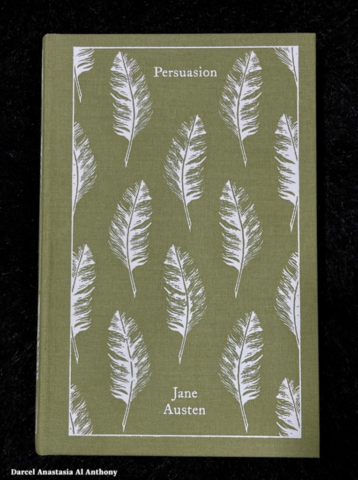I was not persuaded by Jane Austen’s Persuasion

Like almost every English Literature major in NUS, I adore Jane Austen.
I am not afraid of admitting that I spent most of this year reading and watching Austen novels and adaptations respectively. Sense and Sensibility is one of my favourite novels, the BBC adaptation of Pride and Prejudice (1995) is one of my favourite television shows, while Clueless (1995), a modern-day adaptation of Emma, will forever remain a cult classic in my books.
However, my experience reading Persuasion was like having a bucket of iced water suddenly hurled at you — I was completely thrown off-guard.
I should have guessed that Persuasion would be a stark contrast to the other Austen titles. As Persuasion was published posthumously in 1818 a year after Austen’s death, it is her last published work. This eventually led to rumours that Persuasion was actually unfinished, which explains Austen’s atypical writing style; her beloved witty scenes and charming characters were scarce. It is also no secret that the title was chosen by Austen’s brother, Henry. Perhaps Persuasion was in fact not fully polished yet.
Despite my lack of warming up to Persuasion, it is still a nice novel but was I truly, pardon the pun, persuaded by it? Not in the slightest. Perhaps this is because Austen is one of my favourite authors and I expected much more. Bring in Austen’s trademarks — the burlesque comedy, the brazen heroine, the brilliance of the Regency Era. Instead, the plot is slow-paced and Anne is too timid for my taste.

In comparison to other Austen titles, Persuasion was mellow. The possibility of an old puppy love blossoming sets the novel up for a bang but everything else cascades in a despondent fashion instead of a dynamic one.
The plot could have been more engaging if secondary characters like the Musgroves were more vibrant. Instead, they fell flat and were forgettable to me. Only in the last few chapters did the pacing pick up and feel like a love story. While many found Persuasion to be one of the more sardonic Austen novels, I thought it bland and boring. The mocking of Anne’s father, Sir Walter Elliot, and his vanity and obsequious manners, was the only humorous part.
Like in true Austen fashion, I also wish that there were more hints about the main and secondary characters’ feelings and personalities. In Pride and Prejudice, Austen wrote plenty about Mr Fitzwilliam Darcy’s growing affections for Elizabeth Bennet. Though it may not seem obvious to Elizabeth then, it was as clear as day to the readers and secondary characters that Darcy fancied Elizabeth. I expected this kind of writing in Persuasion and I believe that it would have made the ending much more fulfilling and of course, the plot exciting. Instead, Wentworth comes across as the unlikeable ex-boyfriend whose ego is maimed for something that happened nearly a decade ago. To put it simply, Wentworth is curt and unsympathetic to Anne.

All these aside, I do appreciate the decision to focus on an unmarried woman in her late 20s. Persuasion is set in the early 19th century when most people, especially women, would feel pressured to marry young for societal reasons. Anne is sombre and tends to keep to herself.
Unlike other Austen heroines who are much more exuberant and optimistic, Anne is a crestfallen figure who is blighted by life; she has been yearning for a man with whom she broke an engagement to for several years simply because she was persuaded to do so. She shies away from attention unlike other Austen heroines like Emma Woodhouse and Fanny Price. Her restraint from being excessive with material goods coupled with how she does not take much pride in her appearance makes her Sir Elliot’s least favourite daughter. Needless to say, Anne is often overlooked and seems to be the carrier of immense misfortune.
However, being the oldest Austen heroine, Anne remains the most level-headed and mature. Throughout the novel, she learns to think and make decisions for herself. She constantly questions the concept of classism and how unjust it is. This is a significant character arc as her family’s narrow-minded perception on social classes is mainly why she rejected Wentworth. At that time, men who joined the navy were gradually rising to the same level as gentlemen who do not work for a living, like Sir Elliot. The navy was beginning to be seen as a promising and respectable profession, provoking the ire of Sir Elliot and many other characters who worry about the growing insignificance of birth and social classes.
For Anne to fall in love and to continue being in love with Wentworth after many years apart, takes a lot of dedication. Her affections for Wentworth have remained unchanged, and one can say the same for Wentworth. At almost every opportunity, Anne goes against social norms and everything that she has learnt and abided by for her whole life. It takes much courage to stand up to what you believe is right and for that, Anne is now one of my favourite Austen characters.
I believe that Persuasion is better suited for a more mature audience. For Anne, it seems like the better parts of her life have passed and she spends the rest of her days living in deep longing and regret. Only a reader with that much of life experience would fully appreciate the novel and connect with Anne on a better level. Perhaps I should come back to the novel twenty years’ from now; I may be able to relate to it then. I suppose that Persuasion is just one of those books that you would only fall in love with as time passes and I dare say it might even be a sentimental read on a rainy afternoon. The ending, which includes Wentworth’s touching letter, is definitely very soothing for the soul.
Persuasion takes a very refreshing take on lamenting on past mistakes and evolving social hierarchy, and is a unique novel for that time period. It may not be everyone’s cup of tea, but it is definitely worth a read.
Rating: 3/5
By: Darcel Anastasia Al Anthony
